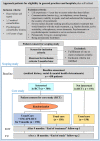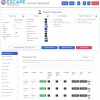Integrated care for older multimorbid heart failure patients: protocol for the ESCAPE randomized trial and cohort study
- PMID: 36907651
- PMCID: PMC10192276
- DOI: 10.1002/ehf2.14294
Integrated care for older multimorbid heart failure patients: protocol for the ESCAPE randomized trial and cohort study
Abstract
Escape: Evaluation of a patient-centred biopsychosocial blended collaborative care pathway for the treatment of multimorbid elderly patients.
Therapeutic area: Healthcare interventions for the management of older patients with multiple morbidities.
Aims: Multi-morbidity treatment is an increasing challenge for healthcare systems in ageing societies. This comprehensive cohort study with embedded randomized controlled trial tests an integrated biopsychosocial care model for multimorbid elderly patients.
Hypothesis: A holistic, patient-centred pro-active 9-month intervention based on the blended collaborative care (BCC) approach and enhanced by information and communication technologies can improve health-related quality of life (HRQoL) and disease outcomes as compared with usual care at 9 months.
Methods: Across six European countries, ESCAPE is recruiting patients with heart failure, mental distress/disorder plus ≥2 medical co-morbidities into an observational cohort study. Within the cohort study, 300 patients will be included in a randomized controlled assessor-blinded two-arm parallel group interventional clinical trial (RCT). In the intervention, trained care managers (CMs) regularly support patients and informal carers in managing their multiple health problems. Supervised by a clinical specialist team, CMs remotely support patients in implementing the treatment plan-customized to the patients' individual needs and preferences-into their daily lives and liaise with patients' healthcare providers. An eHealth platform with an integrated patient registry guides the intervention and helps to empower patients and informal carers. HRQoL measured with the EQ-5D-5L as primary endpoint, and secondary outcomes, that is, medical and patient-reported outcomes, healthcare costs, cost-effectiveness, and informal carer burden, will be assessed at 9 and ≥18 months.
Conclusions: If proven effective, the ESCAPE BCC intervention can be implemented in routine care for older patients with multiple morbidities across the participating countries and beyond.
Keywords: Blended collaborative care; Depression; Heart failure; Multi-morbidity; Multinational trial; Psychological distress; Quality of life.
© 2023 The Authors. ESC Heart Failure published by John Wiley & Sons Ltd on behalf of European Society of Cardiology.
Conflict of interest statement
The following authors declare conflicts of interest: Christoph Herrmann‐Lingen, Susanne S. Pedersen, Søren T. Skou, Christian Albus, Dagmar Lühmann, Tim Friede, Niels E. Bruun, Jens Søndergaard. For details, see
The following authors declare they have no conflicts of interest: Christine Zelenak, Jonas Nagel, Kristina Bersch, Lisa Derendorf, Frank Doyle, Birgit Herbeck Belnap, Sebastian Kohlmann, Carlos A. Velasco, Thomas Asendorf, Christian Axel Bang, Margarita Beresnevaite, Matthew M. Burg, Sussi Friis Buhl, Peter H. Gæde, Anna Markser, Klaudia Vivien Nagy, Chiara Rafanelli, Sanne Rasmussen, Jan Sørensen, Adrienne Stauder, Stephanie Stock, Stefano Urbinati, Diego Della Riva, Rolf Wachter and Florian Walker.
See
Figures


References
-
- Savarese G, Becher PM, Lund LH, Seferovic P, Rosano GMC, Coats A. Global burden of heart failure: a comprehensive and updated review of epidemiology. Cardiovasc Res. 2022; 118: 3272–3287. - PubMed
-
- Ponikowski P, Anker SD, AlHabib KF, Cowie MR, Force TL, Hu S, Jaarsma T, Krum H, Rastogi V, Rohde LE, Samal UC, Shimokawa H, Budi Siswanto B, Sliwa K, Filippatos G. Heart failure: preventing disease and death worldwide. ESC Heart Fail. 2014; 1: 4–25. - PubMed
-
- McDonagh TA, Metra M, Adamo M, Gardner RS, Baumbach A, Böhm M, Burri H, Butler J, Čelutkienė J, Chioncel O, Cleland JGF, Coats AJS, Crespo‐Leiro MG, Farmakis D, Gilard M, Heymans S, Hoes AW, Jaarsma T, Jankowska EA, Lainscak M, Lam CSP, Lyon AR, McMurray JJV, Mebazaa A, Mindham R, Muneretto C, Francesco Piepoli M, Price S, Rosano GMC, Ruschitzka F, Kathrine Skielund A. 2021 ESC guidelines for the diagnosis and treatment of acute and chronic heart failure. Eur Heart J. 2021; 42: 3599–3726. - PubMed
-
- Ladwig K‐H, Baghai TC, Doyle F, Hamer M, Herrmann‐Lingen C, Kunschitz E, Lemogne C, Beresnevaite M, Compare A, von Känel R, Sager HB, Kop WJ. Mental health‐related risk factors and interventions in patients with heart failure: a position paper endorsed by the European Association of Preventive Cardiology (EAPC). Eur J Prev Cardiol. 2022; 29: 1124–1141. - PubMed
Publication types
MeSH terms
Grants and funding
LinkOut - more resources
Full Text Sources
Medical

